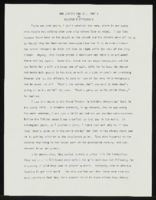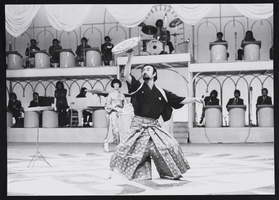Search the Special Collections and Archives Portal
Search Results
June Monroe and Kazuko Atomura oral history interviews
Identifier
Abstract
Oral history interviews with June Monroe and Kazuko Atomura conducted by Cecilia Winchell and Stefani Evans on July 14 and July 19, 2022 for Reflections: the Las Vegas Asian American and Pacific Islander Oral History Project. In the first interview, Kazuko Atomura describes her childhood in Taiwan and Tokyo, Japan, and shares both happy and difficult mememories of that time. Atomura eventually moved to Los Angeles, California, where she reconnected with a man she previously met in Japan. She married him and together had their daughter, June Monroe, and another son while living in Corpus Christi, Texas. After difficult medical procedures involving Atomura's husband and Monroe's younger brother, Brian, the family relocated to Las Vegas, Nevada. Monroe recalls attending Las Vegas High School and Bonanza High School, and the struggle of making new friends as a young person.
In the second interview, the mother and daughter discuss racism, discrimination, and identity. Kazuko Atomura recalls her many experiences with discrimination as a result of both her appearance and language barriers. June Monroe discusses how she came to be proud of her Japanese heritage, while Atomura discusses some of the community activities she has been involved in since living in Las Vegas including the Japanese Culture Club and odori dancing. Then, both Atomura and Monroe discuss Monroe's brother, Brian, who received two kidney transplants; one from Monroe's father and one from Monroe herself. Atomura talks about the shrines she has built for Brian, the experience of him being on dialysis, care taking, and his final days. Monroe shares about her activism with organ donation, being regularly involved with the Nevada Donor Network and helping to pass significant pieces of legislation within the area of organ donation.
Digital audio available; no transcript available.
Archival Collection

Elaine Newton oral history interview: transcript
Date
Archival Collection
Description
Oral history interview with Elaine Newton conducted by Cecilia Winchell, Kristel Peralta, and Vanessa Concepcion on May 19, 2021 for Reflections: The Las Vegas Asian American and Pacific Islander Oral History Project. Elaine Newton shares her family's history living in Hawaii and Japan, and memories from her childhood growing up with her six siblings in Honolulu. She talks about becoming a flight attendant for Pan American World Airways and how she met her former husband, Wayne Newton, after a stop in Vietnam. Elaine recalls their courtship and marriage as well as what Las Vegas life, fashion, and entertainment were like during the 1980s. She also speaks about racial discrimination and anti-asian violence in the past and present.
Text

Gene Noboru Nakanishi oral history interview: transcript
Date
Archival Collection
Description
Oral history interview with Gene Noboru Nakanishi conducted by Ayrton Yamaguchi, Cecilia Winchell, and Stefani Evans on April 2, 2021 for Reflections: The Las Vegas Asian American and Pacific Islander Oral History Project. Gene Nakanishi shares his detailed family history from both his father's and his mother's families. He discusses his paternal grandfather's work on the Union Pacific Railroad, the family's internment in Wyoming during World War II, and his father's release from the camp by joining the United States Army Signal Corps. Nakanishi also talks of his maternal grandfather who was of the Bushido ("warrior") class in Osaka, Japan, and his grandfather's work with Christian missionaries. He shares details of his mother's restaurant employment in Los Angeles and her opening of Osaka Japanese Bistro in Las Vegas in 1969. Nakanishi also talks about being born and raised in Las Vegas, his musical schooling at Berklee College of Music in Boston, and his graduate education at Harvard University. He discusses his work as a band teacher for the Clark County School District, his involvement in the Idyllwild Arts Summer Program band camp, and his interests in jazz music.
Text

"And Justice for All: Part V": article draft by Roosevelt Fitzgerald
Date
Archival Collection
Description
From the Roosevelt Fitzgerald Professional Papers (MS-01082) -- Drafts for the Las Vegas Sentinel Voice file. On the mistreatment/discrimination of Chinese, Japanese, and other minority groups.
Text
Anna Nakazawa oral history interview
Identifier
Abstract
Oral history interview with Anna Nakazawa conducted by Donnielle Dove on November 29, 2022 for the Reflections: the Las Vegas Asian American and Pacific Islander Oral History Project. In this interview, Nakazawa reflects on her upbringing in Las Vegas, Nevada what it was like growing up and what it was like growing up Asian-American in Southern Nevada. Nakazawa is currently enrolled at the University of Nevada, Las Vegas and studying criminal justice. She recalls attending Saturday Japanese school every weekend until she was in high school, allowing her to connect with her cultural background and describes annual trips to Japan in the summer. Nakazawa's ambition and determination is something she takes pride in, and speaks of her multiple jobs and the financial opportunities they bring her. Furthermore, she discusses the importance of education and sharing Asian-American news on social media so more people have a better understanding of what is it like to be Asian-American.
Archival Collection

Koma Zuru performing at Harrah's, image 001 of 002: photographic print
Date
Archival Collection
Description
Image

